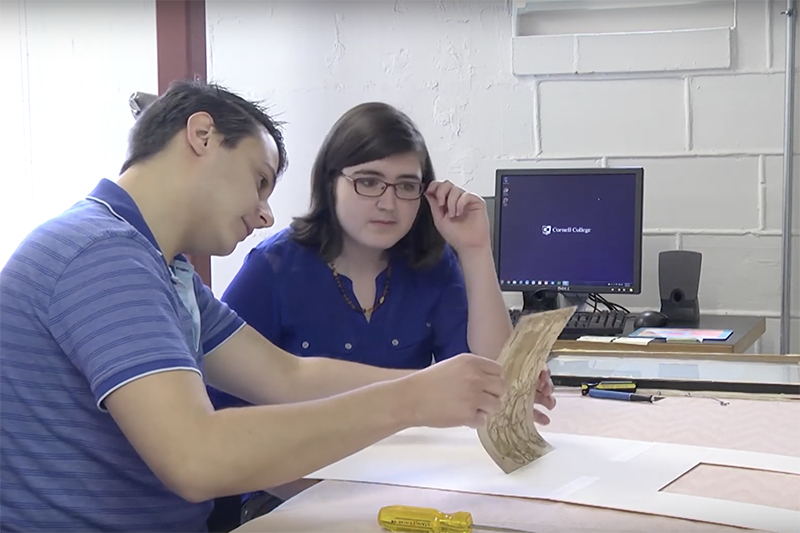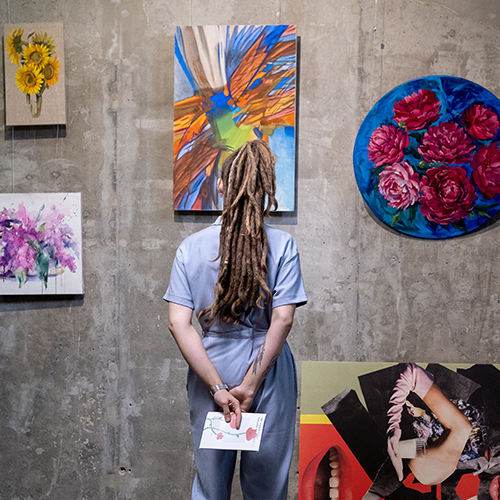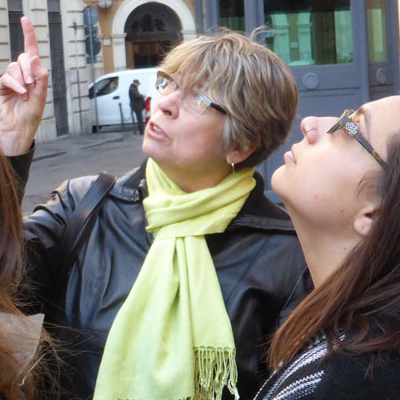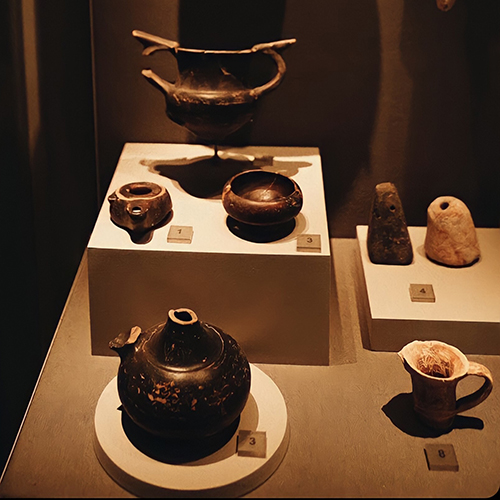Art History examines the past to inform our future
As a major in art history you may be looking towards a future where you are involved in the production of art and the study of the history of art across time and cultures. You might take on a future role sharing your knowledge as the curator of a museum or gallery, or teaching art or art history.
As an art historian, you can learn the challenges of mounting exhibitions addressing any number of cultures and topics through real examples. At Cornell, this means your class can spend time with theory and in the field, applying your reading directly to a real-world example.
You might find yourself reading selected articles about the history of collecting and displaying African art in class, then visiting a display of African art at the Art Institute of Chicago and comparing the installation to that of the Western European and North American art. Or you might meet with the exhibit curator and have the opportunity to ask how the curator of the African and Native American art collections at the Detroit Institute of Art reorganized their exhibition spaces.
Art students can apply for extra financial support in the form of an art scholarship for up to $5,000 per year over four years.
Cornell Summer Research Institute: investigating donated artworks
Jessica Meis ’19 and Steven Coburn ’18 spent 10 weeks examining a collection of 58 European drawings donated to the college as the Sonnenschein art collection and comparing their findings to that of a Chicago firm who assessed it in 1997.

The project culminated in a rare undergraduate exhibition curated by the students and mentored by art history professor Christina Penn-Goetsch. Watch a video about their project.
Art history course and degree requirements

Art History topics include the arts and architecture of antiquity in the Mediterranean, in the Renaissance and Baroque Italy, and in modern and postmodern art. These topics are supplemented by courses addressing the global arts of West Africa, African American art and the diaspora, Latin American art, and transnational feminist art.
Art history capstone
The Senior Capstone is a yearlong project where you will engage in sustained research in art history. You will make an original contribution to the discipline through a senior paper, public presentation, and oral defense.
Recent senior capstones have included titles such as:
- Bramante's Tempietto, Saint Peter, and Syncretism - Jessica Berge '24
- Kehinde Wiley's Judith and Holoferenes: Two Contexts - Helena Cheatham'24
- Rubens's Leda and the Swan: An Absolutist Interpretation - Anna Greve '24
- The Dichotomy of a Male Renaissance Perspective - Isabella Strauss '24

Art history happens off campus—see it in person
You'll have rich opportunities for off-campus experiences, with study-abroad programs regularly in Italy and field trips to museums.
Classes frequently take daylong field trips to the Chicago Art Institute and the Des Moines Art Center. If an appropriate exhibition is on display, it would not be unusual for classes to visit the Walker Art Center in Minneapolis or the Milwaukee Museum of Art. One Course makes these types of field trips possible when a semester plan would not.

Internships in Art History
Cornell students have taken on internships in museums assisting in curation of exhibits, helping to promote museum events and programs, and learning about what it takes to successfully manage the day-to-day operations of a public museum. Internship locations have included the National Museum of American History, Cedar Rapids Museum of Art, the Ceramics Center in Cedar Rapids, Metropolitan Museum of Art in New York, Mexican Museum in San Francisco, Minneapolis Institute of Art, Museum of Contemporary Art in Chicago, Philbrook Museum in Tulsa, Puerto Rican Museum of Art, Rochester Art Center, and Russian Icon Museum in Boston.
What are Cornell students doing in internships? Check out their blogs
Career Opportunities for Art Historians
Cornell students have gone on to pair their knowledge of art history with careers in the arts and beyond. Our alumni have held roles as Manager, J.B. Robinson Jewelers, Port Huron, Michigan; Visitor and Volunteer Services Coordinator, National Czech and Slovak Museum, Cedar Rapids, Iowa; Guest services, Metropolitan Museum of Art, New York; as a staff member at the Chipstone Foundation Museum, Milwaukee, Wisconsin; and as an antiquities trafficking researcher, Smithsonian Institution, Washington, D.C.
The Berry Career Institute can help you identify what you’ll pursue with your knowledge of art and how it impacts our culture and our worldviews.

